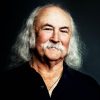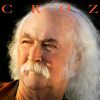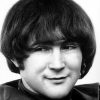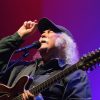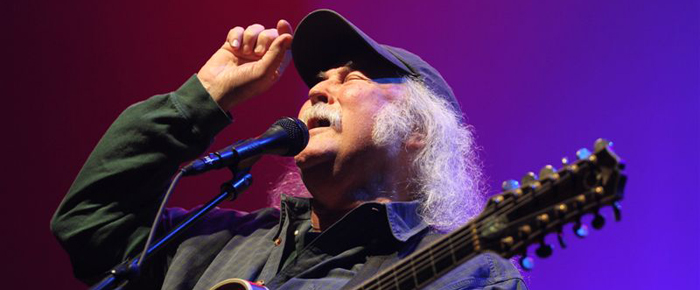
By Eleni P. Austin
David Crosby has led a charmed existence for at least 50 of his 72 years. He was born David Van Cortlandt Crosby in 1941. His mother, Aliph, was a descendent of the prominent Van Cortlandt family. His father Floyd was an Academy Award winning cinematographer.
David and his older brother Ethan grew up in Hollywood and small beach communities like Santa Barbara and Carpinteria. At an early age, David was exposed to Classical and Folk music. Family sing-a-longs revealed a preternatural gift for harmony.
During his teen years, David’s brother, Ethan, introduced him to the cool West Coast Jazz of Gerry Mulligan and Chet Baker. Even as David was starring in school musicals, his academic performance was so poor he was asked to leave two different schools.
For David, his prodigious musical talent was a means to an end. Initially, he figured being an actor would work as the perfect pick-up line. But movies took too long. Saying he was a musician and then getting up at a coffee house to sing was an instant aphrodisiac.
Crosby gravitated toward the Folk scene in Greenwich Village, initially as a member of Les Baxter’s Balladeers. Singer/songwriter, Fred Neil became a mentor. Producer Jim Dickinson produced Crosby’s first solo sessions. He loved the Village ambiance, but as a native Californian, couldn’t really take the harsh New York winters.
By 1964, he returned to Los Angeles and hooked up with Roger (ne’ Jim) McGuinn. A former member of the Chad Mitchell Trio, McGuinn had been making ends meet as a session musician. Inspired by the Beatles, McGuinn and Crosby recruited Gene Clark, Chris Hillman and Michael Clarke and the Byrds (originally known as the Jet Set, and then the Beefeaters) were born.
The Byrds pretty much invented Folk-Rock by adding drums, sturdy harmonies and chiming Rickenbacker guitar riffs to the Folk songs by Bob Dylan and Pete Seeger. As they began composing songs, disparate influences like John Coltrane and Ravi Shankar resulted in trippy tracks like “Eight Miles High,” and “So You Want To Be A Rock ‘N’ Roll Star.”
But five healthy egos could not be contained in one band. David Crosby jumped ship when the band refused to record “Triad,” his paean to ménage a trois. (Jefferson Airplane later covered it).
Crosby drifted a bit, indulging in his passion for sailing. He first heard Joni Mitchell sing in a tiny Folk club in Coconut Grove, Florida. He was so impressed with her music, that he brought her back to Los Angeles, insisting she play guitar and sing for a number of his friends. Crosby helped secure Mitchell’s first record contract. His presence as “Producer” on Mitchell’s debut insured that she had complete autonomy.
David Crosby connected with Stephen Stills in 1968 at Mama Cass’ house. Buffalo Springfield had recently broken up and the two were at loose ends. They began jamming and were later joined by Graham Nash. They persuaded Nash to ditch his popular British Invasion band, The Hollies and join them permanently.
Their eponymous debut, released in 1969, presented a combination of ethereal harmonies and socially conscious songs. It was an immediate hit. The following year, Neil Young joined up and the quartet recorded Déjà vu. It garnered rave reviews and even greater sales. But the death of Crosby’s girlfriend, Christine Hinton, prevented him from fully enjoying his success. It also provided the catalyst for Crosby’s descent into drug addiction.
To keep from wallowing in the grief, Crosby enlisted a posse of famous pals to record his first solo album, If I Could Only Remember My Name. For the next 15 years, he continued to write, tour and record in different combinations: Crosby-Nash, CSN and CSN &Y. The results were mixed as drug consumption became his true vocation. He functioned, but his “lost weekend” lasted almost 20 years.
By 1985, strung out from freebasing cocaine, David Crosby was on the run from the law. He finally got clean following a nine month stint in a Texas prison. He was allowed to start a band in prison, but had to say goodbye to his long hair and trademark Walrus moustache.
Since becoming (relatively) clean and sober in the late ‘80s, Crosby has faced a series of triumphs and setbacks with his usual leonine grace. He married his longtime girlfriend Jan Dance in 1987.
In 1994 their house was destroyed in the Northridge earthquake, Crosby also underwent a liver transplant. At the same time he connected with his son, James Raymond, who had been given up for adoption at birth. (Crosby also has two grown daughters, Donovan Anne and Erica).
After undergoing fertility treatments, Jan gave birth to the couple’s son, Django. Despite dealing with Hepatitis C, Type 2 Diabetes and heart disease, Crosby has continued to write record and tour. When Stills, Nash and Young weren’t available he formed CPR with Jeff Pevar and his son, James Raymond. They toured and recorded two studio albums and two live efforts.
Although Crosby has recorded many albums in group settings, he has only released two other solo efforts since his debut, Yes I Can in 1989 and Thousand Roads in 1993. Finally, 20 years on, he has released his fourth solo album, simply entitled Croz.
Croz begins tentatively with “What’s Broken.” Over a slippery melody the lyrics explore the feeling of being alone in a crowd. The tune is anchored by brushed drums, fluid Fender Rhodes fills and a slithery guitar solo, courtesy ex-Dire Straits front man, Mark Knopfler. Crosby’s social conscience has never diminished. That remains evident on at least four tracks, “Time I Have,” “Radio,” “Set That Baggage Down” and “Dangerous Night.”
“Time..” opens gingerly, just slight percussion and acoustic guitar. The song gathers steam as Crosby rails against complacency…”There’s so much disturbing short–sighted shit, we must do better than just live with it/ Fear soaks into the concrete just like grease, fear is the antithesis of peace.” A keening electric guitar solo underscores his frustration.
“Radio” is a propulsive, piano driven rocker. Here Crosby uses a nautical metaphor to illustrate how the 1% has an obligation to support the other 99%. The storm that rages is economical, and we must all lend a helping hand… “Your hands are slippery, you feel like turning away to run free/But you can pull someone out of the sea.”
“…Baggage” blends sharp angular guitar riffs and handclap percussion. Crosby’s multi-tracked harmonies are “Almost Cut My Hair” dissonant as he urges to let go of past mistakes and emotional burdens.
On “Dangerous Night” a martial cadence propels a series of fluttery piano notes. Crosby is still kicking against the pricks…”I try to write Buddha and it comes out guns, I vote for peace and the blood still comes/ I want to believe I can pass happy to my child, but the truth gets lost and the system runs wild…I’m a troubled soul searching for peace in the night.”
Two songs, “Holding On To Nothing” and “Slice Of Time,” allow Crosby to stretch in a jazzy direction.” The former is hushed and elegant: Minimal accompaniment from acoustic guitar, organ and fretless bass place Crosby’s dulcet vocals in the spotlight. A melancholy trumpet solo from Wynton Marsalis washes over this contemplative gem.
The latter is a spiritual cousin to Crosby’s “Déjà vu.” Shifting time signatures are accented by minor key piano clusters and intertwined guitar. Crosby’s phrasing is sharp and economical as he points out the obvious, time is ephemeral.
Other interesting tracks include the acoustic reverie of “The Clearing,” and “Morning Falling” which matches apocalyptic visions to a plaintive melody.
The album closes with the jazzy tour de force of “Find A Heart.” The intricate arrangement of this supple melody owes a cosmic debt to Steely Dan’s “Aja.”
Weaving a tapestry of piano, Fender Rhodes, synthesizer, percussion and acoustic guitar, each takes a moment to shine. Crosby’s vocal gymnastics recall the sophisticated elan’ of Jazz vocalese pioneers, Lambert, Kendricks and Ross. Sharp soprano sax notes dart in and out of the mix like a Hummingbird.
David Crosby co-produced Croz with Daniel Garcia and his son, James Raymond. Raymond also co-wrote many of the songs.
David Crosby’s extracurricular activities might always overshadow his prodigious musical talents. That’s a shame. Croz is probably his most assured effort to date. A triumphant addition to a rich musical legacy.



































